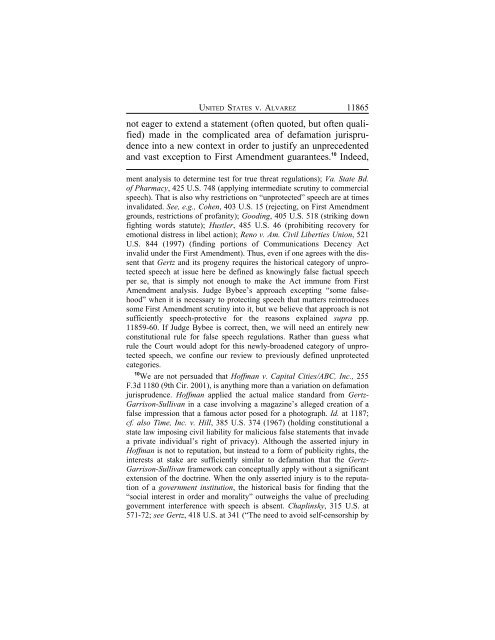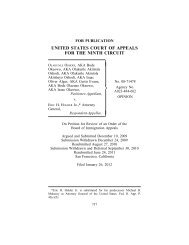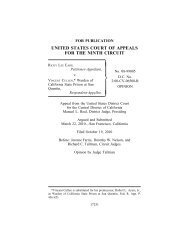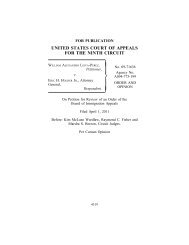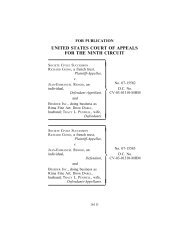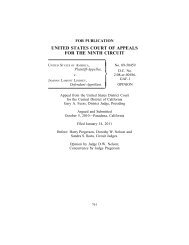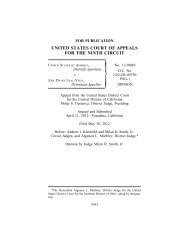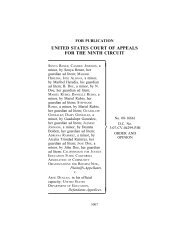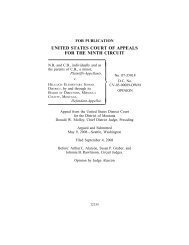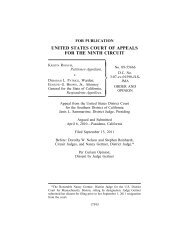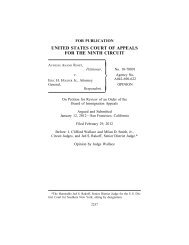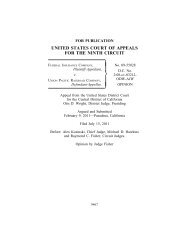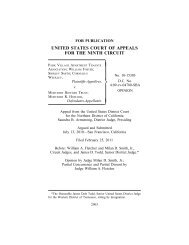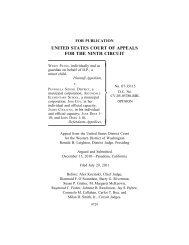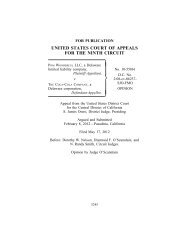USA v. Xavier Alvarez - Ninth Circuit Court of Appeals
USA v. Xavier Alvarez - Ninth Circuit Court of Appeals
USA v. Xavier Alvarez - Ninth Circuit Court of Appeals
You also want an ePaper? Increase the reach of your titles
YUMPU automatically turns print PDFs into web optimized ePapers that Google loves.
UNITED STATES v. ALVAREZ<br />
11865<br />
not eager to extend a statement (<strong>of</strong>ten quoted, but <strong>of</strong>ten qualified)<br />
made in the complicated area <strong>of</strong> defamation jurisprudence<br />
into a new context in order to justify an unprecedented<br />
and vast exception to First Amendment guarantees. 10 Indeed,<br />
ment analysis to determine test for true threat regulations); Va. State Bd.<br />
<strong>of</strong> Pharmacy, 425 U.S. 748 (applying intermediate scrutiny to commercial<br />
speech). That is also why restrictions on “unprotected” speech are at times<br />
invalidated. See, e.g., Cohen, 403 U.S. 15 (rejecting, on First Amendment<br />
grounds, restrictions <strong>of</strong> pr<strong>of</strong>anity); Gooding, 405 U.S. 518 (striking down<br />
fighting words statute); Hustler, 485 U.S. 46 (prohibiting recovery for<br />
emotional distress in libel action); Reno v. Am. Civil Liberties Union, 521<br />
U.S. 844 (1997) (finding portions <strong>of</strong> Communications Decency Act<br />
invalid under the First Amendment). Thus, even if one agrees with the dissent<br />
that Gertz and its progeny requires the historical category <strong>of</strong> unprotected<br />
speech at issue here be defined as knowingly false factual speech<br />
per se, that is simply not enough to make the Act immune from First<br />
Amendment analysis. Judge Bybee’s approach excepting “some falsehood”<br />
when it is necessary to protecting speech that matters reintroduces<br />
some First Amendment scrutiny into it, but we believe that approach is not<br />
sufficiently speech-protective for the reasons explained supra pp.<br />
11859-60. If Judge Bybee is correct, then, we will need an entirely new<br />
constitutional rule for false speech regulations. Rather than guess what<br />
rule the <strong>Court</strong> would adopt for this newly-broadened category <strong>of</strong> unprotected<br />
speech, we confine our review to previously defined unprotected<br />
categories.<br />
10 We are not persuaded that H<strong>of</strong>fman v. Capital Cities/ABC, Inc., 255<br />
F.3d 1180 (9th Cir. 2001), is anything more than a variation on defamation<br />
jurisprudence. H<strong>of</strong>fman applied the actual malice standard from Gertz-<br />
Garrison-Sullivan in a case involving a magazine’s alleged creation <strong>of</strong> a<br />
false impression that a famous actor posed for a photograph. Id. at 1187;<br />
cf. also Time, Inc. v. Hill, 385 U.S. 374 (1967) (holding constitutional a<br />
state law imposing civil liability for malicious false statements that invade<br />
a private individual’s right <strong>of</strong> privacy). Although the asserted injury in<br />
H<strong>of</strong>fman is not to reputation, but instead to a form <strong>of</strong> publicity rights, the<br />
interests at stake are sufficiently similar to defamation that the Gertz-<br />
Garrison-Sullivan framework can conceptually apply without a significant<br />
extension <strong>of</strong> the doctrine. When the only asserted injury is to the reputation<br />
<strong>of</strong> a government institution, the historical basis for finding that the<br />
“social interest in order and morality” outweighs the value <strong>of</strong> precluding<br />
government interference with speech is absent. Chaplinsky, 315 U.S. at<br />
571-72; see Gertz, 418 U.S. at 341 (“The need to avoid self-censorship by


